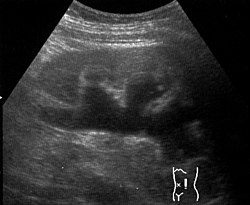Hydronephrosis

Editor-In-Chief: Prab R Tumpati, MD
Obesity, Sleep & Internal medicine
Founder, WikiMD Wellnesspedia &
W8MD's medical weight loss NYC, sleep center NYC
Philadelphia medical weight loss and Philadelphia sleep clinics
| Hydronephrosis | |
|---|---|

| |
| Synonyms | |
| Pronounce | N/A |
| Specialty | N/A |
| Symptoms | Flank pain, abdominal mass, nausea, vomiting, urinary tract infection |
| Complications | Kidney failure, urinary tract infection, sepsis |
| Onset | |
| Duration | |
| Types | Unilateral hydronephrosis, bilateral hydronephrosis |
| Causes | Kidney stones, congenital blockage, blood clot, tumor |
| Risks | |
| Diagnosis | Ultrasound, CT scan, MRI |
| Differential diagnosis | Pyelonephritis, renal cyst, polycystic kidney disease |
| Prevention | |
| Treatment | Surgery, ureteral stent, nephrostomy |
| Medication | Pain management, antibiotics |
| Prognosis | |
| Frequency | |
| Deaths | |






Hydronephrosis is a condition characterized by the swelling of a kidney due to a build-up of urine. It happens when urine cannot drain out from the kidney to the bladder from a blockage or obstruction. Hydronephrosis can occur in one or both kidneys.
Causes[edit]
The primary cause of hydronephrosis is obstruction in the urinary system which prevents urine from draining properly. Obstructions can occur at any point in the urinary system, from the kidneys to the urethra. Some common causes include:
- Kidney stones
- Congenital blockage (a defect that is present at birth)
- Blood clot
- Tumor or cancer in the urinary system
Symptoms[edit]
The symptoms of hydronephrosis depend on whether the condition is acute or chronic, the degree of obstruction, and whether it is on one side or both. In some cases, there may be no symptoms. When symptoms do occur, they may include:
- Pain in the side and back, below the ribs
- Urinary tract infection
- Frequent urination
- Nausea and vomiting
Diagnosis[edit]
Hydronephrosis is usually diagnosed using imaging tests. These may include:
Treatment[edit]
Treatment for hydronephrosis focuses on removing the obstruction and allowing urine to flow through the urinary system. This may involve:
- Medication to relieve pain and fight infection
- Surgery to remove the obstruction
- Catheter to drain urine from the kidney
See also[edit]
Ad. Transform your life with W8MD's Budget GLP-1 injections from $49.99


W8MD offers a medical weight loss program to lose weight in Philadelphia. Our physician-supervised medical weight loss provides:
- Weight loss injections in NYC (generic and brand names):
- Zepbound / Mounjaro, Wegovy / Ozempic, Saxenda
- Most insurances accepted or discounted self-pay rates. We will obtain insurance prior authorizations if needed.
- Generic GLP1 weight loss injections from $49.99 for the starting dose of Semaglutide and $65.00 for Tirzepatide.
- Also offer prescription weight loss medications including Phentermine, Qsymia, Diethylpropion, Contrave etc.
NYC weight loss doctor appointmentsNYC weight loss doctor appointments
Start your NYC weight loss journey today at our NYC medical weight loss and Philadelphia medical weight loss clinics.
- Call 718-946-5500 to lose weight in NYC or for medical weight loss in Philadelphia 215-676-2334.
- Tags:NYC medical weight loss, Philadelphia lose weight Zepbound NYC, Budget GLP1 weight loss injections, Wegovy Philadelphia, Wegovy NYC, Philadelphia medical weight loss, Brookly weight loss and Wegovy NYC
|
WikiMD's Wellness Encyclopedia |
| Let Food Be Thy Medicine Medicine Thy Food - Hippocrates |
Medical Disclaimer: WikiMD is not a substitute for professional medical advice. The information on WikiMD is provided as an information resource only, may be incorrect, outdated or misleading, and is not to be used or relied on for any diagnostic or treatment purposes. Please consult your health care provider before making any healthcare decisions or for guidance about a specific medical condition. WikiMD expressly disclaims responsibility, and shall have no liability, for any damages, loss, injury, or liability whatsoever suffered as a result of your reliance on the information contained in this site. By visiting this site you agree to the foregoing terms and conditions, which may from time to time be changed or supplemented by WikiMD. If you do not agree to the foregoing terms and conditions, you should not enter or use this site. See full disclaimer.
Credits:Most images are courtesy of Wikimedia commons, and templates, categories Wikipedia, licensed under CC BY SA or similar.
Translate this page: - East Asian
中文,
日本,
한국어,
South Asian
हिन्दी,
தமிழ்,
తెలుగు,
Urdu,
ಕನ್ನಡ,
Southeast Asian
Indonesian,
Vietnamese,
Thai,
မြန်မာဘာသာ,
বাংলা
European
español,
Deutsch,
français,
Greek,
português do Brasil,
polski,
română,
русский,
Nederlands,
norsk,
svenska,
suomi,
Italian
Middle Eastern & African
عربى,
Turkish,
Persian,
Hebrew,
Afrikaans,
isiZulu,
Kiswahili,
Other
Bulgarian,
Hungarian,
Czech,
Swedish,
മലയാളം,
मराठी,
ਪੰਜਾਬੀ,
ગુજરાતી,
Portuguese,
Ukrainian


